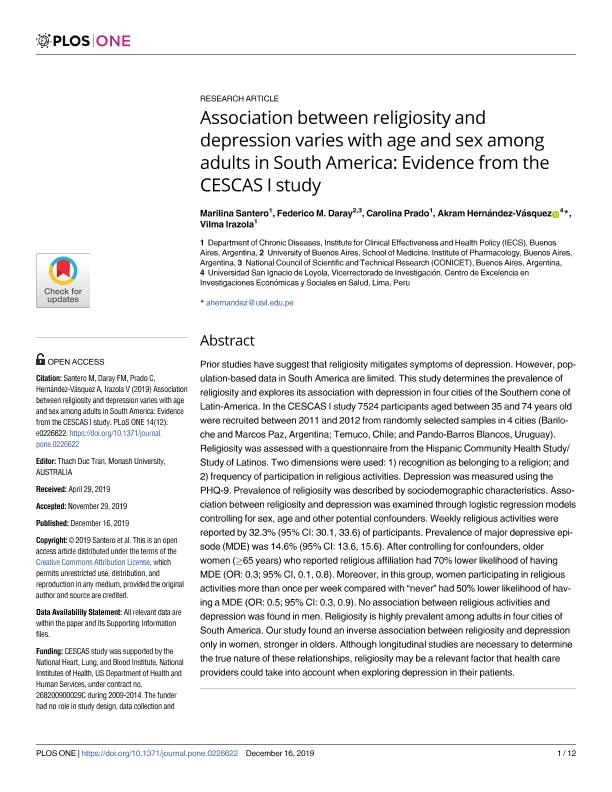Mostrar el registro sencillo del ítem
dc.contributor.author
Santero, Marilina

dc.contributor.author
Daray, Federico Manuel

dc.contributor.author
Prado, Carolina
dc.contributor.author
Hernández Vásquez, Akram
dc.contributor.author
Irazola, Vilma

dc.date.available
2020-07-07T19:45:43Z
dc.date.issued
2019-12
dc.identifier.citation
Santero, Marilina; Daray, Federico Manuel; Prado, Carolina; Hernández Vásquez, Akram; Irazola, Vilma; Association between religiosity and depression varies with age and sex among adults in South America: Evidence from the CESCAS I study; Public Library of Science; Plos One; 14; 12; 12-2019
dc.identifier.issn
1932-6203
dc.identifier.uri
http://hdl.handle.net/11336/109052
dc.description.abstract
Prior studies have suggest that religiosity mitigates symptoms of depression. However, population-based data in South America are limited. This study determines the prevalence of religiosity and explores its association with depression in four cities of the Southern cone of Latin-America. In the CESCAS I study 7524 participants aged between 35 and 74 years old were recruited between 2011 and 2012 from randomly selected samples in 4 cities (Bariloche and Marcos Paz, Argentina; Temuco, Chile; and Pando-Barros Blancos, Uruguay). Religiosity was assessed with a questionnaire from the Hispanic Community Health Study/Study of Latinos. Two dimensions were used: 1) recognition as belonging to a religion; and 2) frequency of participation in religious activities. Depression was measured using the PHQ-9. Prevalence of religiosity was described by sociodemographic characteristics. Association between religiosity and depression was examined through logistic regression models controlling for sex, age and other potential confounders. Weekly religious activities were reported by 32.3% (95% CI: 30.1, 33.6) of participants. Prevalence of major depressive episode (MDE) was 14.6% (95% CI: 13.6, 15.6). After controlling for confounders, older women (≥65 years) who reported religious affiliation had 70% lower likelihood of having MDE (OR: 0.3; 95% CI, 0.1, 0.8). Moreover, in this group, women participating in religious activities more than once per week compared with "never" had 50% lower likelihood of having a MDE (OR: 0.5; 95% CI: 0.3, 0.9). No association between religious activities and depression was found in men. Religiosity is highly prevalent among adults in four cities of South America. Our study found an inverse association between religiosity and depression only in women, stronger in olders. Although longitudinal studies are necessary to determine the true nature of these relationships, religiosity may be a relevant factor that health care providers could take into account when exploring depression in their patients.
dc.format
application/pdf
dc.language.iso
eng
dc.publisher
Public Library of Science

dc.rights
info:eu-repo/semantics/openAccess
dc.rights.uri
https://creativecommons.org/licenses/by-nc-sa/2.5/ar/
dc.subject
DEPRESSION
dc.subject
RELIGION
dc.subject
SOUTH AMERICA
dc.subject.classification
Psiquiatría

dc.subject.classification
Medicina Clínica

dc.subject.classification
CIENCIAS MÉDICAS Y DE LA SALUD

dc.title
Association between religiosity and depression varies with age and sex among adults in South America: Evidence from the CESCAS I study
dc.type
info:eu-repo/semantics/article
dc.type
info:ar-repo/semantics/artículo
dc.type
info:eu-repo/semantics/publishedVersion
dc.date.updated
2020-07-01T17:12:14Z
dc.journal.volume
14
dc.journal.number
12
dc.journal.pais
Estados Unidos

dc.journal.ciudad
San Francisco
dc.description.fil
Fil: Santero, Marilina. Instituto de Efectividad Clínica y Sanitaria; Argentina
dc.description.fil
Fil: Daray, Federico Manuel. Universidad de Buenos Aires; Argentina. Consejo Nacional de Investigaciones Científicas y Técnicas; Argentina
dc.description.fil
Fil: Prado, Carolina. Instituto de Efectividad Clínica y Sanitaria; Argentina
dc.description.fil
Fil: Hernández Vásquez, Akram. Universidad San Ignacio de Loyola; Perú
dc.description.fil
Fil: Irazola, Vilma. Instituto de Efectividad Clínica y Sanitaria; Argentina. Consejo Nacional de Investigaciones Científicas y Técnicas; Argentina
dc.journal.title
Plos One

dc.relation.alternativeid
info:eu-repo/semantics/altIdentifier/doi/http://dx.doi.org/10.1371/journal.pone.0226622
dc.relation.alternativeid
info:eu-repo/semantics/altIdentifier/url/https://journals.plos.org/plosone/article?id=10.1371/journal.pone.0226622
Archivos asociados
